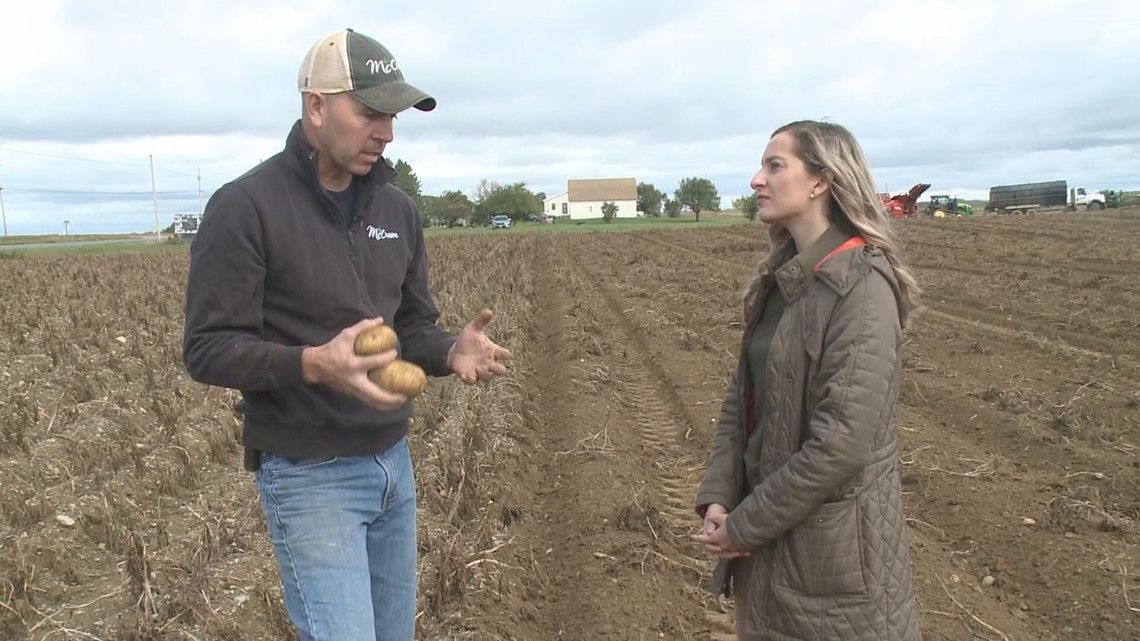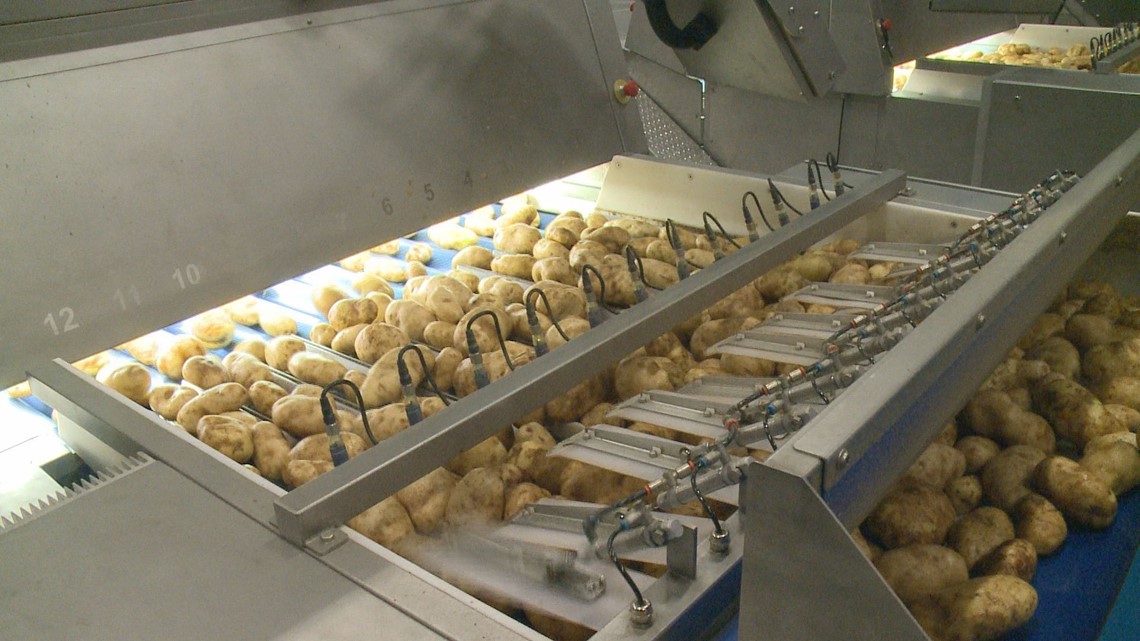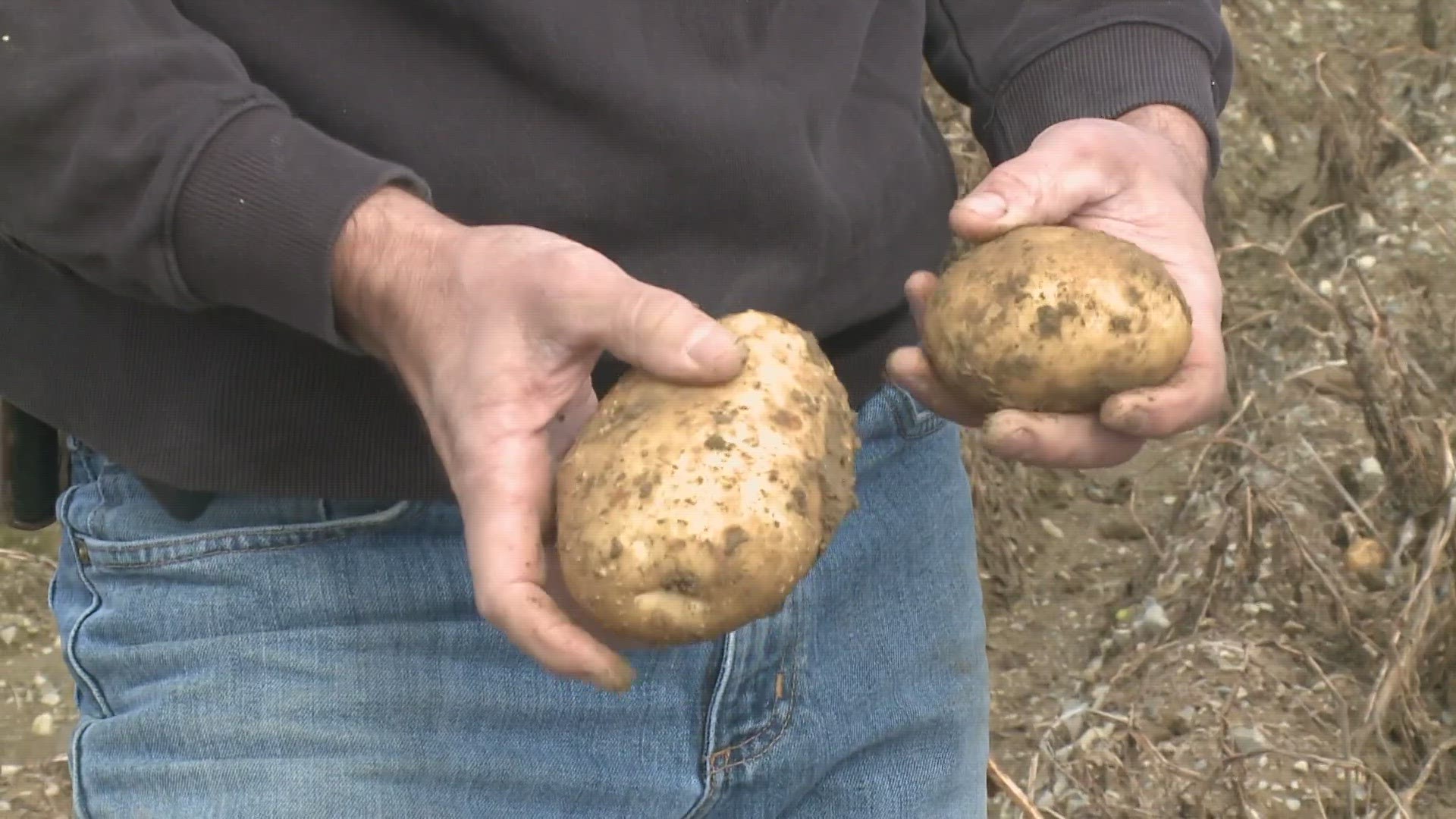WASHBURN, Maine — There aren't many farms in Maine that can boast they've been owned by the same family for more than 130 years. One of those is the McCrums.
What started as a single farm in Mars Hill in 1886 has grown into a company that not only grows potatoes but also turns them into frozen French fries at a new state-of-the-art facility in Washburn.
During the spring of 2022, the McCrum Belfast potato plant burned to the ground.
Late this March, the company announced it had no plan to rebuild but instead would focus on growing its recently opened Washburn facility.
NEWS CENTER Maine reporter Hannah Yechivi went to The County last fall to see the McCrum operation for herself and found one that is not only proud of its products but of the people behind them.
"One of our keys to our growth is just sticking together as a family. Instead of trying to just all do our own thing, we figured out that we are stronger together," Darrell McCrum, co-owner and farmer of McCrum, said.
McCrum said growing, harvesting, and processing potatoes year-round is not an easy task. But it's task that has gotten easier throughout the years thanks to machinery and technology.
"So right there you have it. What I just did with my hand, these machines do all day long," Darrell McCrum said. "It's been amazing the past 10 [to] 15 years how quick the technology has changed. Years ago, we didn't know what our yield was until we were all done with the harvest."
The potato company takes care in every step the process, from planting, growing, caring, harvesting, storing, producing, and shipping potatoes for chips to companies like Frito Lay, Herr's, Utz, and Cape Cod chips.
Windrowers separate dirt and rocks from potatoes, and then the harvester will come through, put the potatoes on the truck, and off they go to a storage.
"In front we have two wind rowers that are coming up through, and what they are doing, they are each taking six rows and combining it together for the harvester to pick up," McCrum explained.
McCrum explains harvesters nowadays can dig 60 to 80 acres of potatoes per day. It's technology that has allowed them to keep buying small family farms and increasing their acreage as they keep their quality and commitment to their suppliers.
"The quality of the potato now that we harvest compared to years ago is a lot better," Darrell said, noting its sustainable farming practices. "We will put potatoes on it for one year and then let it rest two to three years before we put another crop on."


McCrum said they are starting to see other growers rest the land like they do as a way for potatoes to grow bigger and better during the years they grow the crop.
Another key to their success is the helping hand migrant workers provide. Last harvest season the company had 15 migrant workers for the duration of two months.
"Es una oportunidad muy grande, porque nosotros los Mexicanos no tenemos alla, con la facilidad que hay aqui para ganarnos el dinero. Es mas facil aqui que en Mexico," worker Jose Carmona said. "It's a very big opportunity, one that we don't have in Mexico. It's easier here for us to earn money, easier than in Mexico."
"Que tengan estudio lo principal, donde vivir, para comer, y que esten bien alimendatos," Jose Carmona said. "For them to be able to study, to have where to live, and for them to eat well."
Jose Carmona said coming to Maine is always one of his favorite seasonal jobs. He enjoys his stay here and said they treat them well and with respect, and it's a time of year where it's not too hot, so it makes their handy labor not as difficult.
"Vamos a regresar, si el patron esta contento con nosotros, vamos a regresar," Carmona said. "We will come back. If our boss here is happy, we will be back!"


Their biggest challenge is always mother nature. Darrell said Maine is lucky that most farmers don't use as much irrigation as other states need, but it's always a gamble how much rain will fall from the sky and how many potatoes will come out, as 80 to 85 percent of a potato is made from water.
"Until you dig it up you are just nervous, because when we grow this crop we are providing for a lot of families. If we don't do a good job, we are going to let them down," McCrum expressed.
Last October McCrum harvested 80,000 tons of potatoes, one of its highest harvests ever.
"Eighteen years ago, we purchased a processing facility to make potato products, and that's flourished over the years. And just two years ago, we built a new facility here in Aroostook County, in Washburn, that we make French fries and potato wedges there," McCrum explained.
With about 100 workers, the state-of-the-art facility in Washburn is interestingly enough almost all run by machinery and customizes its fry batches, including buyers like Applebee's, TGI Friday's, Red Robbins, and Golden Corral.
"Right now we have around 80 different customers that we supply fries to on a steady basis," McCrum said.
"For years and years, we sold to a customer that made French fries and said Maine wasn't good enough, the potatoes here are not good enough to make a good fry. We got a little ugly about that after a while; they *are good potatoes. ... We can do a good job, and this just proves it, right?!" Darrell said with pride as he watched potato boxes full of fries and ready to be shipped.
Darrell said at McCrum people will always know where their food comes from.
"My sister and her husband, they grow our seed potatoes that we buy, and we will grow them into a processing potato. My dad and other family members will process that into a French fry. My brother will handle the transportation of that, so we have complete control over that supply chain for that French fry, and that's something we take great pride in."

